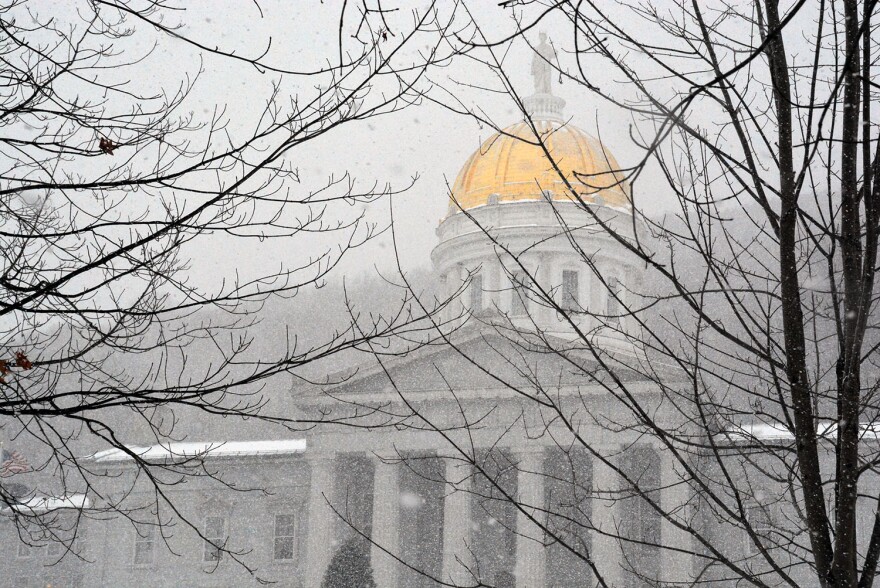Journalists in Vermont – including those at VPR News – are cheering the state Senate's passage of a so-called "shield" bill that would protect reporters from having to choose between betraying the trust of a source and potential jail time.Protecting anonymous sources and the possibility of jailing reporters may sound like the stuff of Watergate, the Pentagon Papers or recent revelations about Russian involvement with U.S. politics, but reporters in Vermont aren’t strangers to these issues.
“In October 2015, a Vermont State Police detective showed up at the offices of Seven Days and said he was interested in obtaining emails, drafts of stories, notebooks, recordings,” says Paul Heintz, the political editor for Seven Days who has led advocacy efforts for the bill. (Disclosure: VPR News Director John Dillon has also participated in advocacy efforts related to the bill. Dillon was not involved in the reporting, editing or production of this story.)
In 2015, the paper was covering sexual assault allegations against Norm McAllister, who was at the time a state senator representing Franklin County.
Investigators wanted to know if Seven Days' reporting had turned up any material that could shed new light on the case.
Seven Days ended up with three subpoenas related to the case, and VPR's Peter Hirschfeld got one too for his reporting on McAllister.
None of the reporters cooperated with the prosecution.
“To do our job, we have to have the trust of our sources, and our sources will not trust us and will not speak to us if they believe that we are going to end up on the stand talking about what it is they've told us, whether it's on the record or off the record,” Heintz says. “We're serving a really important public service role in this process, and it's a different role than the prosecution or the defense is serving.”
In Vermont, reporters who get a subpoena aren't legally allowed to refuse to give up information because they promised a source they wouldn't reveal it.
"To do our job, we have to have the trust of our sources, and our sources will not trust us and will not speak to us if they believe that we are going to end up on the stand talking about what it is they've told us, whether it's on the record or off the record." - Paul Heintz, Seven Days
“When that happens, and that happens all the time around the country,” Heintz says, “reporters have to choose between going to jail or betraying their sources, and that is an incredibly difficult place for a journalist to be in.”
This bill would give journalists the legal privilege to withhold information given to them in confidence, and to protect the identity of confidential sources.
Information gathered “on the record” would still be obtainable by subpoena, but only in certain situations when the information would be vital and isn't available by other means.
Before the state Senate unanimously approved the bill earlier this week, Republican Sen. Joe Benning said that even though he's a lawyer and understands the value of subpoena power, he supports the effort to make sure things told to reporters "off the record" stay off the record.
“The bottom line in that tradeoff is that we lose something much greater in society by chilling the willingness of the press to do its job,” Benning said.
Former state Sen. John Campbell is now the executive director of the Vermont Department of State's Attorneys and Sheriffs, so he oversees the county prosecutors across the state. He says he supports the concept of a shield law, but he has concerns about the language in the bill.
“We have to point out some of the darker sides here,” he says.
Campbell says he understands the need for legitimate journalists to be protected, but he's worried that the absolute protection for confidential information included in the Senate-approved bill could have unintended consequences.
"Wherever there is a keyboard or a recording device, there is a potential for someone to claim that the sources from where they got the information was in fact protected." - John Campbell, Vermont Department of State's Attorneys and Sheriffs
That's because – as Heintz says – the bill's definition of journalism was designed to accommodate the changing nature of news media.
“For example,” Heintz says, “ten years ago, if the Legislature had been crafting this bill and had attempted to list various types of media organizations, it likely would not have included online news organizations in that list, but we know now that VTDigger.org is one of the most vibrant news organizations in the state.”
Campbell says defining journalism like that could be interpreted to include far less journalistic content, like so-called newsletters shared online among child pornographers, or human smugglers.
“Wherever there is a keyboard or a recording device, there is a potential for someone to claim that the sources from where they got the information was in fact protected,” Campbell says.
Campbell says he doesn't know of examples of non-journalists abusing shield laws like this elsewhere in the country, but he is hoping to work with lawmakers in the House to see if the language can be clarified so that journalism that serves the public interest is protected, but serious criminal activity isn't.




